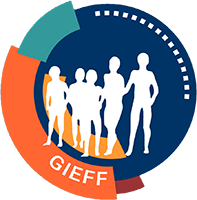Report on the 10th Göttingen International Ethnographic Film Festival
May 12th - May 16th, 2010
The festival is organised by an association, founded in May 2007.
The festival takes place in the heart of Göttingen.
The festival is founding member of CAFFE - Coordinating Anthropological Film Festivals in Europe.
The Festival Programme was composed by an international selection committee, including former and new members. More than 380 films had been submitted. 56 films were selected, 22 for screenings in the student film category, 34 for the main festival, the others for multimedia and online presentations during the festival.
As every year, the student film competition was of special interest and many commented on the very good quality of the films. The presentation of new productions the festival had three main topics: Films on East European countries were shown during the whole festival. Films on "Coping with Global Change" were screened during the whole festival, but mainly on Friday afternoon. Films on " Cultural Heritage in Focus" were screened on Saturday afternoon and Sunday morning.
Following the festival the symposium "Future Past: Cultural Heritage and Collaborative Ethnographic Film Work" took place.
The Student Award went to to the film:
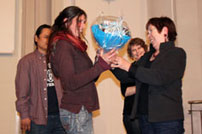
As Long as the Mines Whistle, the Crops Will Dance
by Marie Devuyst, Belgium 2009
In Cransac, there were the mines. Only yesterday, coal still was the rhythm of life in this little town, where working class and rural cultures blended together. Then, the pick-axes stood silent. The film takes us into the everyday life of two families, a rural one, the other one working class. The grand-parents tell us of the Cransac of yesteryear, bearing witness of the dazzling evolution of the world that surrounds them. For the younger ones, everything is left the task to rebuild. Through these souvenirs and everyone’s projects, it is the story of Cransac’s valley that is being told.
The Centro Incontri Umani Award went to to the film:
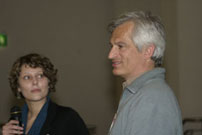
The Bagyeli Pygmies at the Fringes of the World
by François-Philippe Gallois, France 2009
"Before, we were poor but we didn t know it because we lived contentedly in the forest” Discovering the outside world, the Bagyéli Pygmies have seen that they are very poor. Angeline, Marcelline and Pascal are 3 Pygmies who have discovered cars, solid houses and money, and strongly resent that they don t have the right to all that. Following their personal dreams, they encounter the complexities of change that the world imposes on hunter-gatherers. And through their point of view, the film tell us of a story about a small population that doesn t want to disappear.
Meeting point Göttingen International Ethnographic Film Festival
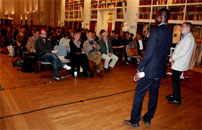
International as always
56 films produced in 32 countries telling stories about people in 33 countries were screened.
345 permanent guests from 32 countries, from all over Europe, but also from Australia, Cameroon, Ethiopia, India, Indonesia, Mexico, New Zealand, Salomon Islands, Sikkim, Thailand, Venezuela, and USA visited the festival.
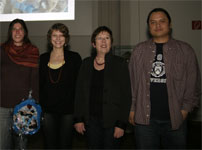
The jury had a difficult task
Julia Binder (Austria),Barbara Keifenheim (Germany), and Ario Danusiri (Indonesia) have taken over the difficult task to select the film for the student award. There were so many good films, of very high standard, and the jury was discussing quite a while till they made their decision...
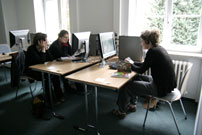
The video library was booked out most of the time
All films submitted to the festival could be watched at in the video library. However, even with 8 stations working, this was still not sufficient.
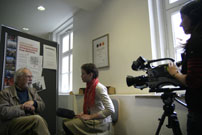
Students discussing - documenting - interviewing
An overwhelming number of student groups from all over Germany visited the festival.
Teachers and students seized the opportunity to discuss the developments of ethnographic and documentary filmmaking.
The students also took the oppertunity to interview the filmmakers present as Asen Balikci on the right. They were astonish how easy it was to get into contact with them and how much they were able to learn in these encounters.
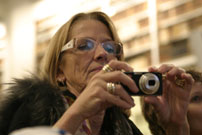
The filmmakers
This year we were happy to welcome some filmmakers who did not present a film but who enriched the discussion tremendously. Lisbeth Holthedal was taking her memory with her.
The 10. Göttingen International Ethnographic Film Festival
We are a little bit proud, that we got so far . It is not easy to manage a festival nowadays. It is less easy, if the main sponsers are fading away. IWF the famous Institut für den Wissenschaftlichen Film founded the festival and supported it as long as it could. People were discussing all night in the nice garden.
We want to thank the manny people who help to organise the festival. There are the organisers, there a many who have taken over the position of assistant organiser. And there are the many students who have helped year after year voluntarily.
We have to thank also our visitors. Their presence, their contributions, their questions, their answers are substantial to the festival.
And sometime some visitors return after some years as filmmakers. It is a delight to see how the young ethnographic filmmakers develop and if the festival has helped on a little bit, it would be nice.
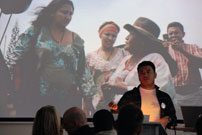
Finally: the symposium
The symposium "Future Past: Cultural Heritage and Collaborative Ethnographic Film Work" gave the possibility to discuss the subject in depth. Anthropologists, filmmakers, and local representatives discussed together how to progress. For many it was the first time they met with people working in the same field.
